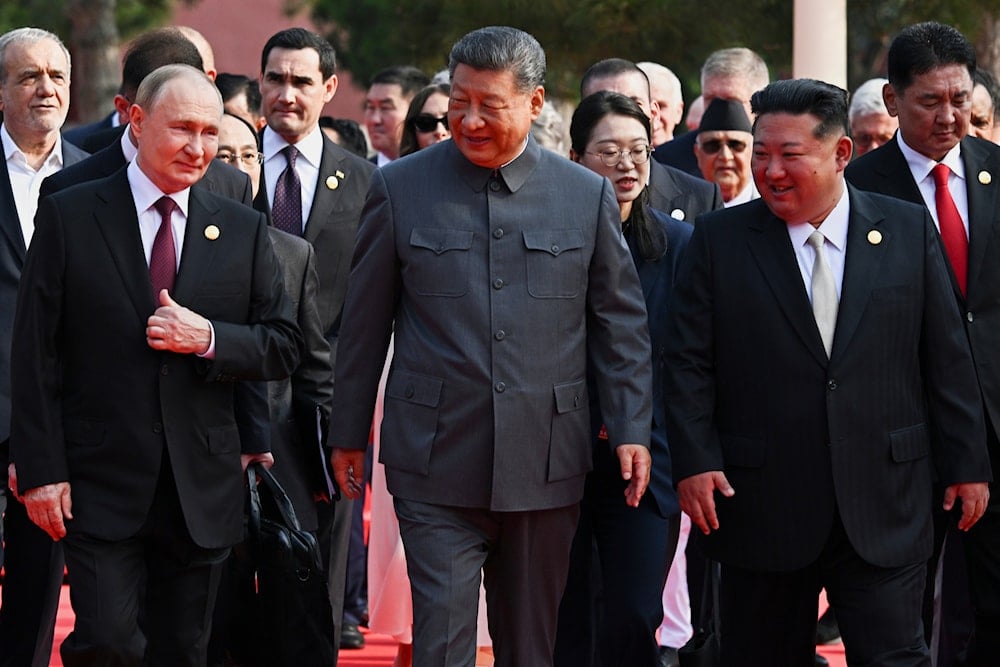Mankind stands between war and peace: Xi Jinping
Xi Jinping warns the world is at a crossroads as China stages its 2025 military parade alongside Putin and Kim, signaling unity against Western pressure.
-

Russian President Vladimir Putin, Chinese President Xi Jinping, and DPRK President Kim Jong Un arrive at a military parade to commemorate the 80th anniversary of Japan's World War II surrender in Beijing, China, Wednesday, Sept. 3, 2025. (AP)
Chinese President Xi Jinping warned that the world was at a crossroads between peace and war while leading China’s largest military parade alongside Russia’s Vladimir Putin and the DPRK's Kim Jong Un, marking the end of a week of high-profile diplomacy viewed as a challenge to the West.
Putin and Kim are among dozens of world leaders attending the parade, which is a large show of military equipment and troops organized to mark 80 years since the end of the Second World War, which China refers to as the Japanese War of Aggression.
Analysts said the striking image of the three men walking the red carpet while chatting and shaking hands sent a message of defiance to the West as US president Donald Trump’s trade tariffs and unpredictable policies put pressure on relations with both allies and rivals.
China unstoppable despite bullying
“Today, mankind is faced with the choice of peace or war, dialogue or confrontation, win-win or zero-sum,” Xi said to a crowd of over 50,000 people gathered at Tiananmen Square, adding that the Chinese people “firmly stand on the right side of history”.
Xi condemned “bullying behaviour” from certain countries in an indirect reference to the United States and declared that China was “unstoppable” as the large-scale display of military equipment was about to begin.
“Beijing is sending a message … that even if Western countries continue to sanction Russia over the Russia-Ukraine War, Beijing will not be afraid to stand by its friend,” Wen-ti Sung, a non-resident fellow at the Atlantic Council’s Global China Hub, told The Guardian.
Friends and foes
China has promoted the parade as a demonstration of unity with other nations, and Kim’s presence marks the first time he has been seen alongside Xi and Putin at the same event, while also being his only second documented trip abroad in six years.
The parade drew an immediate reaction from Trump, who said, “May President Xi and the wonderful people of China have a great and lasting day of celebration,” in a post on his Truth Social Platform. “Please give my warmest regards to Vladimir Putin, and Kim Jong-un, as you conspire against The United States of America," he added.
Other guests include Iranian President Masoud Pezeshkian and Myanmar junta leader Min Aung Hlaing. Meanwhile, no major Western leaders are present, and Kim is accompanied by his daughter Kim Ju-ae, as shown in images released by DPRK state media.
Analysts are closely following the event in China to see if any formal meetings take place between the Chinese, Russian, and Korean leaders.
“If all three were to meet, it would be very striking to the United States, highlighting a potential new cold war dynamic,” Lim Chuan-Tiong, researcher with the Institute for Advanced Studies on Asia at the University of Tokyo, told The Guardian, noting that “If such a meeting does not take place, it is likely because China does not want to overly provoke the US while maintaining a certain degree of triangular ambiguity."
Military hardware, diplomacy, and China's future
After speaking, Xi rode in an open-top car to review the parade, acknowledging the troops and receiving their salutes, while analysts focused on the wide range of military equipment on display, including tanks, drones, long-range and nuclear-capable missiles, fighter jets, stealth aircraft, and several newly revealed weapons systems.
Drew Thompson, a senior fellow at the S. Rajaratnam School of International Studies, said the hardware is meant to “give the United States, Europe and China’s neighbours pause should they consider challenging China’s core national interests”.
One core interest that was not named directly but remained a central focus is Taiwan, and Xi’s speech included multiple references to the “rejuvenation of the Chinese nation,” a phrase commonly used to describe his broader vision for China’s future, which includes Taiwan as part of the country’s territory.

 4 Min Read
4 Min Read








